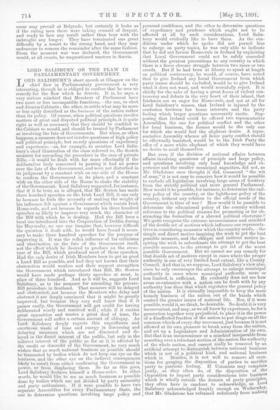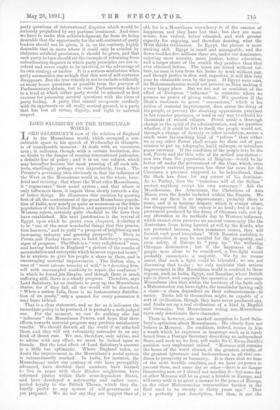LORD SALISBURY ON THE FLAW IN PARLIAMENTARY GOVERNMENT.
TORD SALISBURY'S short speech at Glasgow on the J chief flaw in Parliamentary government is very interesting, though he is obliged to confess that he sees no remedy for the flaw which he detects. It is, lie says, a very serious mischief that Members of Parliament have two more or less incompatible functions,—the one, to elect and dismiss Cabinets ; the other, to settle what may be more or less aptly described as the business of the nation rather than its policy. Of course, when political questions involve matters of great and disputed political principle, it is quite right as well as necessary that they should be confided to the Cabinet to mould, and should be treated by Parliament as involving the fate of Governments. But when, as often happens, a measure does not involve questions of high policy and political principle, but merely questions of expediency and experience,—as, for example, to mention Lord Salis- bury's chief illustration of the class referred to, the Scotch measure for amending the procedure in the case of private Bills,—it would be dealt with far more effectually if the deliberative body concerned in passing it had no power over the fate of the Government, and were not disturbed in its judgment by a constant wish on one side of the House to confirm the Government in its place, and a constant wish on the other side of the House to shake the stability of the Government. Lord Salisbury suggested, for instance, that if it be true, as is alleged, that Mr. Sexton has made three hundred speeches on the Irish Land Bill, it can only be because he feels the necessity of making the weight of his influence felt against a Government which resists Irish Home-rule, and not because he regards his three hundred speeches as likely to improve very much the character of the Bill with which he is dealing. Had the Bill been a local one introduced into the Corporation of Dublin during his Mayoralty, no one can imagine that, however difficult the question it dealt with, he would have found it neces- sary to make three hundred speeches for the purpose of improving it. It was the reflex influence of his criticisms and obstruction on the fate of the Government itself, not the effect which he desired to produce on the struc- ture of the Bill, which produced most of, these speeches. Had the only desire of Irish Members been to got as good a Land Bill as possible, and had they not known that their obstruction would weaken and their support strengthen the Government which introduced that Bill, Mr. Sexton would have made perhaps thirty speeches at most, in place of three hundred, And so it will be, suggests Lord Salisbury, as to the measure for amending the private- Bill procedure in Scotland. That measure will be delayed and obstructed, not because the Members who delay and obstruct it are deeply convinced that it might be greatly improved, but because they very well know that if it passes easily, the Government will get credit for having deliberated wisely and resolved well ; while if it excites great opposition and wastes a great deal of time, the Government will suffer a certain amount of obloquy. As Lord Salisbury deeply regrets this superfluous and enormous waste of time and energy in discussing and delaying measures which are not discussed and de- layed in the direct interest of the public, but only in the indirect interest of the public so far as it 'is affected by the credit or discredit of the Government, he very much wishes that as much national business as possible should be transacted by bodies which do not keep one eye on the business, and the other eye on the indirect consequences likely to result from either confirming. the Government in power, or from displacing them. So far as this goes, Lord Salisbury declares himself a Home-ruler. In other words, be would like to see as much business as possible done by bodies which are not divided by party animosity and party enthusiasm. If it were possible to have two separate Assemblies for every Parliamentary State, the one to determine questions involving large policy and personal confidence, and the other to determine questions of expediency and prudence which ought not to be affected at all by such considerations, Lord Salis- bury would evidently like to have them. As the con- ditions under which he spoke did not permit him to enlarge on party topics, he was only able to indicate that he did not favour Home-rule in Ireland by explaining that Local Government could not be safely conceded without the greatest precautions to any country in which there is a fierce chronic struggle between two races or two creeds. But if he had been at liberty to speak at length on political controversy, he would, of course, have noted that to give Ireland any Local Government from which party issues should be excluded, would be to give Ireland. what it does not want, and would scornfully reject.. It is chiefly for the sake of having a great focus of violent con- troversy and debate in the very heart of their island, that Irishmen are so eager for Home-rule, and not at all for Lord Salisbury's reason, that Ireland is injured by the confusion between her home interests and the party feeling which larger questions necessarily excite. Sup- posing that Ireland could be offered two representative Assemblies, the one for political conflict and the other for local business, the former would be the only one for which she would feel the slightest desire. A repre- sentative Assembly whence all fierce party conflict should be effectually banished, would be to the Irish Party the offer of a mere white elephant of which they would have no desire to avail themselves.
But even if the division of national affairs between affairs involving questions of principle and large policy, and questions involving only local knowledge and ex- perience and the smaller municipal sagacities, did not, as Mr. Gladstone once thought it did, transcend " the wit of man," it is not easy to conceive how it would be possible to exclude all legislation involving large areas of territory from the strictly political and more general Parliament. How would it be possible, for instance, to determine the rail- way policy of the country, or the lighthouse policy of the country, without any relation to the official needs of the Government in time of war P How would it be possible to determine the educational policy of the country without reference to the political reasons for promoting or for ob- structing the formation of a shrewd political electorate ? We quite recognise the extreme inconvenience and mischief of the double set of motives which influence our representa- tives in considering measures which the country needs,—the simple and direct motive inspiring the wish to get the best possible measure, and the oblique and indirect motive in- spiring the wish to subordinate the attempt to get the best possible measure, to the attempt to get rid of the worst possible Government. But we cannot see any remedy for that double set of motives except in cases where the proper authority is one of very limited local extent, like a County Council. And that is, we suppose, Lord Salisbury's view also, since lie only encourages the attempt to enlarge municipal authority in cases where municipal authority, more or less limited, is sufficient. He evidently does not see how areas co-extensive with a nation can be dealt with by any authority less than that which regulates the general policy of the nation. It is virtually impossible to keep the more homely business of the nation out of the hands which control the greater issues of national life. Nor, if it were possible, would it, we think, be desirable. No doubt it is very inconvenient, and may, as we all know by experience, be for a generation together very prejudicial, to place it in the power of a disaffected fraction of the nation to put drags on all the common wheels of every-day movement, just because it is not allowed at its own pleasure to break away from the nation, and set up a Legislature and Administration of its own. But that is an inconvenience or a mischief inseparable from asserting over a reluctant section of the nation the authority of the whole nation, and cannot really be removed by an artificial attempt to distinguish between national business which is not of a, political kind, and national business which is. Besides, it is not well to remove all occa- sions for gauging the disposition of parties to sacrifice party to patriotic feeling, If Unionists may complain justly, as they often do, of the disposition of the Opposition to import party considerations into bnsiness which is wholly outside the domain of party principles, they often have in candour to acknowledge, as Lord Salisbury acknowledged frankly enough on. Wednesday, that Mr. Gladstone has refrained sedulously from making party questions of international disputes which would be seriously prejudiced by any partisan treatment. And since we have to make this acknowledgment, far from its being desirable that the opportunity for the self-restraint of party leaders should not be given, it is, on the contrary, highly desirable that in cases where it could only be avoided by elaborate artificial provisions, it should be given, and that each party in turn should set the example of refraining from subordinating disputes in which party principles are not in- volved and never ought to be involved, to the advantage of its own strategy or tactics. It is a serious misfortune when party animosities rise so high that this sort of self-restraint disappears. But the true remedy is not to exclude artificially as ninny home questions as possible from the purview of Parliamentary debate, but to raise Parliamentary debate to a level at which either party would be ashamed to find excuses for poisoning neutral questions with the virus of party feeling. A party that cannot co-operate cordially with its opponents on all really neutral ground, is a party that has lost all virtue, dignity, and right to national respect.



































 Previous page
Previous page